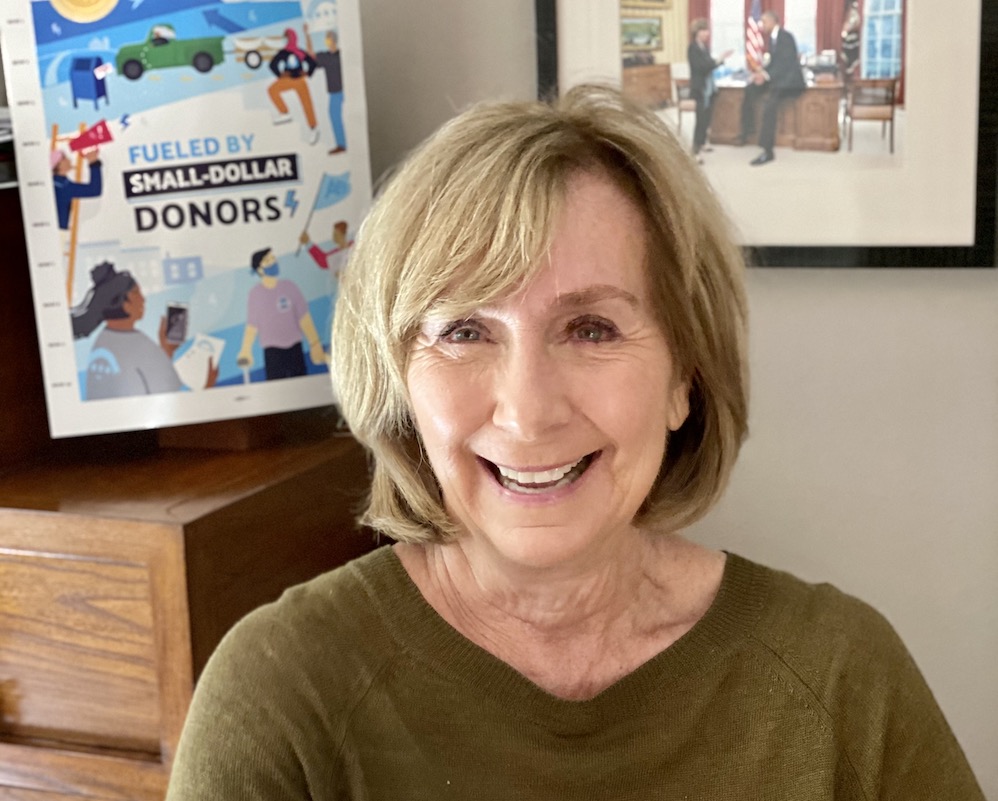
Ann Ravel is the project director of Digital Deception at MapLight, a nonprofit that tracks the influence of money in politics, and a professor at UC Berkeley School of Law. She previously regulated political campaign finance as a member of the California Fair Political Practices Commission and the Federal Election Commission. Before participating in a Zócalo/Center for Social Innovation event, “Can Local Media Restore Trust and Destroy Disinformation?,” she talked about going from regulating political candidates to being one last year in her run for California State Senate, living in Northern California and South America, and how she ended up majoring in philosophy in the Zócalo green room.
What’s your favorite thing about the Bay Area?
In Santa Clara County, where I live, the hillsides. They’re golden in the summer and really green and beautiful in the winter. Plus [they’re] great for hiking.
What’s your least favorite thing about the Bay Area?
Definitely the traffic. It diminished a bit at the beginning of COVID, but the problem with the traffic at that point was that people were driving 100 miles per hour and weaving in and out of traffic and taking advantage of it. Yesterday I went to San Francisco and came back, and probably because there was an accident, there was a huge backup. It kind of never ends, the traffic.
What’s the best thing you’ve eaten since the pandemic began?
I’ve eaten everything! [Laughs.] I would say the best thing that I ate—we do not eat meat, usually—a restaurant in Saratoga put together a dinner for New Year’s Eve. It was amazing, and one dish had Wagyu beef in it, which is not something I’ve ever had before. Together with the salads and wonderful other accompaniments and the dessert—mille-feuille with cream on the side—it was like a real New Year’s Eve celebration out of a box.
What was the toughest thing about making the switch from regulating candidates to becoming one?
The realization that it was even worse than I thought. Regulating candidates for so many years, it was clear that there was a lot of money that was unaccounted for. But it’s worse than I believed. I also didn’t know that in California in particular, [when] it’s a Democrat-on-Democrat race, the unions spend an inordinate amount of money [on their chosen candidate]. That was a rude awakening for me. They spent about $4 million against me.
What word or phrase do you use most often?
Probably it’s “Protect our democracy,” since it’s something I tend to talk about a lot and worry about a lot with regard to a number of the issues that we’re facing. I don’t usually say it to my husband, though, … or the dog, my constant companions.
What teacher or professor changed your life?
My high school speech teacher. He had us all choose a philosopher, and we would then do speeches based on the thinking of that particular philosopher. I think [that], more than anything else, empowered me. I became a philosophy major in college. It also made me more confident in speaking out about issues publicly. And that has made a continuing difference.
If you didn’t live in Northern California, where would you be?
I have family in Brazil, and if it weren’t for [President Jair] Bolsonaro, I would love to be by the beach in Rio.
I can’t imagine really any other place in the country that I would want to live full-time. I was in Washington, D.C., and really loved it, but I was very happy to come home to California. It’s so diverse and forward-thinking. We have problems, no doubt, but they’re, in a way, solvable problems rather than bad ones—and I think we’re in the most beautiful state.
What’s your most vivid memory of your early years growing up in Latin America?
I was in Santiago, Chile, from about the age of 5 to close to 11. You must think I have a hill or mountain obsession, but I remember walking to school and seeing the Andes, and it was incredibly beautiful, even as a very young child. But I also remember the poverty, vividly. I remember going to some of the smaller towns and seeing little children who were extremely, extremely poor. That was an eye-opener for me. I didn’t have a family that had a lot of money, but we weren’t in that situation.
What’s hanging on your living room walls?
I have a picture that was my parents’—a painting that is from Chile—side by side with a mirror picture of a downtown San Jose building. And then I have several photographs and prints from Mexico. I also have a fireplace there that has a mantle, and I have a number of things from Brazil and from Mexico on it.
What’s your biggest pet peeve?
I’m not sure this is exactly a pet peeve, but people who are on the extremes, and don’t really understand the complication of most issues, particularly about government. I think government is complicated, and people don’t understand how you get things done in government. So what drives me crazy is when people think that there are simplistic solutions to things, often at the extremes.



